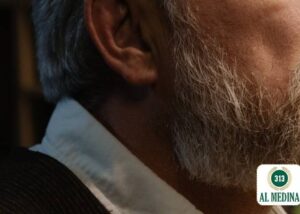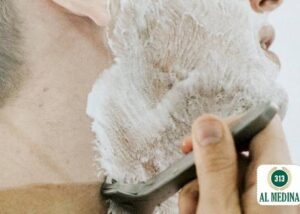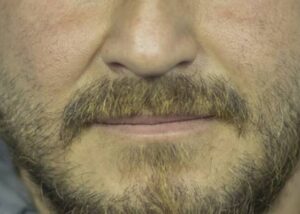Quran
Hadith
Islamic Text
Yes, you should cut your beard if it is longer than a fist length.
حَدَّثَنَا مَرْوَانُ يَعْنِي ابْنَ سَالِمٍ الْمُقَفَّعَ، قَالَ: رَأَيْتُ ابْنَ عُمَرَ يَقْبِضُ عَلَى لِحْيَتِهِ، فَيَقْطَعُ مَا زَادَ عَلَى الْكَفِّ
Marwan ibn Salim al-Muqaffa’ said, I saw Ibn Umar (May Allah Most High be pleased with him) take hold of his beard and cut that which exceeded a handful. (Sunan Abi Dawood, 2357).
The narration above is often quoted by Hanafi scholars when they speak about the Sunnah length of the beard being a fist-length. Although the Hadith does not speak about the Prophet ﷺ himself. Rather it speaks about the action of a Sahaabi. It is assumed that the blessed Sahaabi Abdullah Ibn Umar (May Allah Most High be pleased with them both) was imitating the Sunnah of the Holy Prophet ﷺ.
Based on this ruling, the Hanafi scholars said that one should trim the beard if it grows beyond a fist length. Some scholars did consider it to be Wajid (obligatory) to trim the beard when it goes beyond a fist-length. However other scholar simply said it should be cut without specifying that it is Wajib.
وفي ” المحيط ” اختلف في إعفاء اللحية قال بعضهم: يتركها حتى تكثف وتكبر، والقص سنة فما زاد على قبضة قطعها. (البناية شرح الهداية)
In al-Muheet he said, they differed over the lengthening of the beard. Some of them said, he should leave it until it becomes abundant and large, and cutting it is Sunnah. So, if it goes beyond a fist-length then he should cut it. (Imam al-Ayni, al-Binayah).
Imam Ibn Abideen discussed the ruling of trimming the beard when it is longer than a fist length in detail in the Haashiyah (Radd al-Muhtaar). He narrated the opinion that it is Wajib to trim it, but also narrated two other opinions. Firstly, the opinion that it is recommended and not obligatory (Wajib) to trim if it grows beyond a fist-length. Secondly, the opinion that it is permitted (not obligatory or recommended) to trim if it grows beyond a fist-length.
وَصَرَّحَ فِي النِّهَايَةِ بِوُجُوبِ قَطْعِ مَا زَادَ عَلَى الْقَبْضَةِ بِالضَّمِّ، وَمُقْتَضَاهُ الْإِثْمُ بِتَرْكِهِ
(قَوْلُهُ: وَصَرَّحَ فِي النِّهَايَةِ إلَخْ) حَيْثُ قَالَ وَمَا وَرَاءَ ذَلِكَ يَجِبُ قَطْعُهُ هَكَذَا «عَنْ رَسُولِ اللَّهِ – صَلَّى اللَّهُ عَلَيْهِ وَسَلَّمَ – أَنَّهُ كَانَ يَأْخُذُ مِنْ اللِّحْيَةِ مِنْ طُولِهَا وَعَرْضِهَا» أَوْرَدَهُ أَبُو عِيسَى يَعْنِي التِّرْمِذِيَّ فِي جَامِعِهِ اهـ وَمِثْلُهُ فِي الْمِعْرَاجِ وَقَدْ نَقَلَهُ عَنْهَا فِي الْفَتْحِ وَأَقَرَّهُ قَالَ فِي النَّهْرِ: وَسَمِعْت مِنْ بَعْضِ أَعِزَّاءِ الْمَوَالِي أَنَّ قَوْلَ النِّهَايَةِ يُحِبُّ بِالْحَاءِ الْمُهْمَلَةِ وَلَا بَأْسَ بِهِ اهـ قَالَ الشَّيْخُ إسْمَاعِيلُ، وَلَكِنَّهُ خِلَافُ الظَّاهِرِ وَاسْتِعْمَالُهُمْ فِي مِثْلِهِ يُسْتَحَبُّ
(قَوْلُهُ: إلَّا أَنْ يُحْمَلَ الْوُجُوبُ عَلَى الثُّبُوتِ) يُؤَيِّدُهُ أَنَّ مَا اسْتَدَلَّ بِهِ صَاحِبُ النِّهَايَةِ لَا يَدُلُّ عَلَى الْوُجُوبِ لِمَا صَرَّحَ بِهِ فِي الْبَحْرِ وَغَيْرِهِ إنْ كَانَ بِفِعْلٍ لَا يَقْتَضِي التَّكْرَارَ وَالدَّوَامَ، وَلِذَا حَذَفَ الزَّيْلَعِيُّ لَفْظَ يَجِبُ وَقَالَ وَمَا زَادَ يُقَصُّ وَفِي شَرْحِ الشَّيْخِ إسْمَاعِيلَ لَا بَأْسَ بِأَنْ يَقْبِضَ عَلَى لِحْيَتِهِ، فَإِذَا زَادَ عَلَى قَبْضَتِهِ شَيْءٌ جَزَّهُ كَمَا فِي الْمُنْيَةِ، وَهُوَ سُنَّةٌ كَمَا فِي الْمُبْتَغَى وَفِي الْمُجْتَبَى وَالْيَنَابِيعِ وَغَيْرِهِمَا لَا بَأْسَ بِأَخْذِ أَطْرَافِ اللِّحْيَةِ إذَا طَالَتْ وَلَا بِنَتْفِ الشَّيْبِ إلَّا عَلَى وَجْهِ التَّزَيُّنِ. اهـ. (رد المحتار على الدر المختار)
Imam al-Haskafi: He clearly stated in al-Nihaayah that it is Wajib to cut anything beyond a fist length (Qabdah, with a Dammah). And this dictates that it is sinful to leave it.
Imam Ibn Abideen: His saying, ‘He clearly stated in al-Nihaayah,’ refers to his statement, ‘And everything beyond that is obligatory to cut. This has been narrated from the Messenger of Allah ﷺ. That he ﷺ used to shorten the beard, from its length and width. Abu Isa, meaning al-Tirmidhi, narrated it in his Jami.’ Something similar to it has been mentioned in al-Miraaj. He narrated it from him in al-Fath, and he confirmed it. In al-Nahr he said: I have heard one of the honoured Mawali say, that in al-Nihaayah it says, ‘It is preferred (Uhibu),’ (instead of it is Wajib), and this is reasonable. Shaykh Ismael said, ‘Rather this opposes the apparent meaning. And in this kind of statement one would use (Ustahabu).
His saying: ‘Unless the word Wujoob (necessary) is considered to mean established.’ This is supported by the fact that evidence used by the author of al-Nihaayah does not dictate necessity (Wujoob). Due to what was explicitly mentioned in al-Bahr and other works. That an action (of the Prophet ﷺ), that is not repeated consistently (does not dictate Wujoob). Due to this (Imam) al-Zayla’i omitted the word ‘it is necessary.’ Rather he said, ‘And whatever is beyond it, he cuts.’ And in the commentary of Shaykh Ismaeel, ‘And there is no harm in him taking hold of his beard and if it extends beyond a fist length, he cuts it, as has been mentioned in al-Munya. And in al-Mujtaba, al-Yanaabee and others, it states that there is no harm in trimming the edges of the beard if it is long. There is also no harm in plucking grey hair, unless it is done for adornment.’ (Radd al-Muhtaar).
As for the authenticity of the narration above. Imam Ibn Humaam commented on it, when he, like other Hanafi scholars, mentioned that one should trim what is beyond a fist length:
قَدْ صَحَّ عَنْ ابْنِ عُمَرَ رَاوِي هَذَا الْحَدِيثِ أَنَّهُ كَانَ يَأْخُذُ الْفَاضِلَ عَنْ الْقُبْضَةِ. (فتح القدير)
And indeed it is soundly narrated (Sahih) from (Sayidina) Ibn Umar, the narrator of this Hadith, that he would trim anything beyond a fist length. (Imam Ibn Humaam, Fath al-Qadeer).
And Allah Most High Knows Best.
-Answered by Shaykh Noorud-deen Rashid (15.04.2022)
See also:
Is it Haram to shave your beard
Is a long (fist length) beard Fard or Sunnah?
Leading Prayer with a short beard
See also video:






